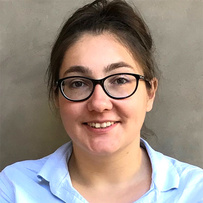Soft Robotics challenges: Design, Fabrication, Control, and Motion Planning
Abstract: More and more robots of the future will be soft. A soft body can absorb impact forces from collisions with obstacles, making robots suitable for unpredictable environments and safe for human-robot interaction. However, widespread application of soft robotics in daily life, business, and consumer products have not yet been achieved, because established robotic technologies, [...]
Hybrid Methods for the Integration of Heterogeneous Multimodal Biomedical Data
Abstract: The prevalence of smartphones and wearable devices for health monitoring and widespread use of electronic health records have led to a surge in heterogeneous multimodal healthcare data, collected at an unprecedented scale. My research focuses on developing machine learning techniques that learn salient representations of multimodal, heterogeneous data for biomedical predictive models. The first [...]
Carnegie Mellon University
Online and Consistent Occupancy Grid Mapping
Abstract: Actively exploring and mapping an unknown environment requires integration of both simultaneous localization and mapping (SLAM) and path planning methods. Path planning relies on a map that contains free and occupied space information and is efficient to query, while the role of SLAM is to keep the map consistent as new measurements are continuously [...]
Carnegie Mellon University
A Planning Framework for Persistent, Multi-UAV Coverage with Global Deconfliction
Abstract: Planning for multi-robot coverage seeks to determine collision-free paths for a fleet of robots, enabling them to collectively observe points of interest in an environment. Persistent coverage is a variant of traditional coverage where coverage-levels in the environment decay over time. Thus, robots have to continuously revisit parts of the environment to maintain a [...]
The Robots are Coming – to your Farm! AKA: Autonomous and Intelligent Robots in Unstructured Field Environments
Abstract: What if a team of collaborative autonomous robots grew your food for you? In this talk, I will discuss some key advances in robotics, machine learning, and autonomy that will one day enable teams of small robots to grow food for you in your backyard in a fundamentally more sustainable way than modern mega-farms! [...]
Carnegie Mellon University
‘Unboxing’ anomaly detection and panoptic segmentation
Abstract: Panoptic segmentation is a recent problem in computer vision that attempts to classify each pixel in an image according to its semantic and instance label (accomplishing both semantic segmentation and instance segmentation respectively). Most existing panoptic and instance segmentation methods run a detection-first pipeline, where a bounding box is placed around an object and [...]
Carnegie Mellon University
Self-Supervised Learning on Mobile Robots Using Acoustics, Vibration, and Visual Models to Build Rich Semantic Terrain Maps
Abstract: Humans and robots would benefit from having rich semantic maps of the terrain in which they operate. Mobile robots equipped with sensors and perception software could build such maps as they navigate through a new environment. This information could then be used by humans or robots for better localization and path planning, as well [...]
Self-Driving Cars & AI: Transforming our Cities and our Lives
Abstract: Recent algorithmic and hardware improvements resulted in several success stories in the field of Artificial Intelligence (AI) which impact our daily lives. However, despite its ubiquity, AI is only just starting to make advances in what may arguably have the largest societal impact thus far, the nascent field of autonomous driving. At Uber ATG, [...]
Carnegie Mellon University
Transfers Between Multiple Service Robots
Abstract: With the deployment of more robots, human-robot interaction will no longer be limited to a one-to-one interaction between a user and a robot. Instead, users will likely have to interact with multiple robots, simultaneously or sequentially, throughout their day to receive services and complete different tasks. In this thesis proposal, I am proposing joint [...]
Carnegie Mellon University
Machine Learning Parallelism Could Be Adaptive, Composable and Automated
Abstract: In recent years, the pace of innovations in the fields of machine learning has accelerated. To cope with the sheer computational complexity of training large ML models on large datasets, researchers in SysML have created algorithms and systems that parallelize ML training and inference over multiple CPUs or GPUs, or even multiple computing nodes [...]
MSR Thesis Talk – Matt Martone
Title: Design and Control of a Large Modular Hexapod Abstract: Legged robotic systems have made great strides in recent years, but unlike wheeled robots, limbed locomotion does not scale well. Long legs demand huge torques, driving up actuator size and onboard battery mass. This relationship results in massive structures that lack the safety, portability, [...]
Improving Robot and Deep Reinforcement Learning via Quality Diversity and Open-Ended Algorithms
Abstract: Quality Diversity (QD) algorithms are those that seek to produce a diverse set of high-performing solutions to problems. I will describe them and a number of their positive attributes. I will then summarize our Nature paper on how they, when combined with Bayesian Optimization, produce a learning algorithm that enables robots, after being damaged, to adapt in 1-2 minutes [...]
Carnegie Mellon University
Online Kinodynamic Planning for Teams of Aerial Robots in 3-D Workspaces
Abstract: An efficient online planning or replanning methodology is a critical requirement for scalable and responsive real world multi-robot deployments. The need to replan typically stems from the invalidation of existing plans due to incomplete knowledge of the environment, or, from scenarios that necessitate changing goal locations in response to evolving application requirements. In this [...]
Go, fastMRI, and Minecraft: Exploring the limits of AI
Abstract: The application of AI across various domains demonstrates both the promise of existing techniques but also their limitations. In this talk, I explore three recent projects and how they shed light on the progress of AI and the challenges to come. These projects include ELF OpenGo a reimplementation of AlphaZero, fastMRI for reducing the time [...]












